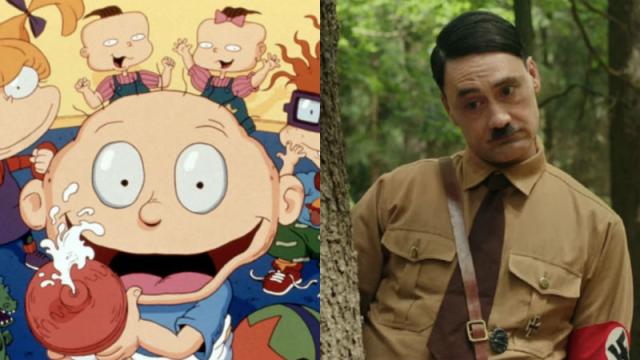On a long, long, long list of films or TV shows that writer-director Taika Waititi could have listed as influences on his new film, Jojo Rabbit, one you never, ever would have thought of is Rugrats. Yes, the Nickelodeon show Rugrats. And yet, that’s exactly what he said in a recent interview about the film.
Jojo Rabbit, which opens in December in Australia, is about a young boy named Jojo (Roman Griffin Davis) growing up in Nazi Germany. Jojo loves the Nazis, even though he doesn’t quite grasp their true ideals, and he’s forced to deal with that when he discovers his mother Rosie (Scarlett Johansson) has hidden a young Jewish girl named Elsa (Thomasin McKenzie) in Jojo’s house. Battling his beliefs and his emotions becomes a complex proposition for a young boy who loves his country so much he has Adolf Hitler (Waititi) as his imaginary friend.
The film ends up being about humanity shining through during the atrocities of war and learning about what’s good and evil along the way. It also shies away from a lot of the violence audiences have come to expect from World War II films and that’s where Rugrats comes in.
Gizmodo was among the journalists in a roundtable interview at Fantastic Fest in Austin, Texas last month when Waititi was asked about his choice to keep away from that violence.
“Well, I feel like so many other movies did it better than me, showing the brutality and the atrocities of what happened,” Waititi said. “And I also wanted to keep it… It’s like Rugrats…”
“Another big influence on your work,” co-star Stephen Merchant interjected as everyone laughed. Fear not, Waititi went on to explain how a movie about Nazis compares to a ‘90s animated show about talking babies with the surname Pickles.
“I want [it] to feel more from a kid’s point of view and how they interpret some of these things,” Waititi explained. “When I was a child, seeing violence and things in my life, my memories of them are not accurate. I think they’ve been put through a child’s filter where they feel more cinematic sometimes or they feel like pieces of art or cartoonish. And so I wanted to kind of keep some sort of innocence around that stuff and not to be gratuitous.”
This is why, in the film, much of the violence is seen off-screen and even some of the violent images on-screen are not front and centre. That’s a dichotomy that, yes, may bring to mind something like Rugrats where the story is told through a baby’s perspective. However, it’s also a good visual representation of Waititi’s films as a whole. Films that can’t really be seen in just one way.
“I think [finding that tonal balance] makes it harder in some ways to describe my films to people,” Waititi said. “With the exception of maybe [What We Do In the] Shadows, none of them are pure comedies [and] none of them are pure dramas. They’re always a mix and they go back and forth.”
Don’t go back and forth between wanting to see Jojo Rabbit or not. It’s an excellent film and it opens December 26.
